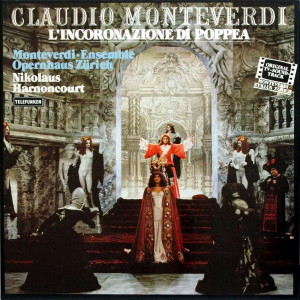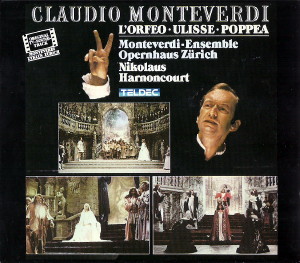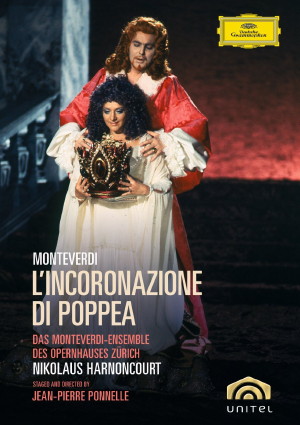 |
3 LP -
6.35593 FK - (p) 1981
|

|
| 6 CD -
8.35807 XB - (c) 1988 |
 |
| 2 DVD -
0440 073 4174 2 - (c) 2007 |
|
Claudio
Monteverdi (1567-1643)
|
|
|
|
|
|
|
|
| L'Incoronazione di Poppea |
|
|
|
|
|
|
|
| Prologo |
|
6' 57" |
|
| - Sinfonia: "Deh, nasconditi, o
virtù" - (Fortuna, Virtù, Amore) |
6' 57" |
|
A1 |
| Atto Primo |
|
73' 43" |
|
| - Scena I: "E pure io torno qui"
- (Ottone) |
6' 28" |
|
A2 |
| - Scena II: "Chi parla" - (Due
Soldati) |
3' 44" |
|
A3 |
| - Scena III: "Signor, deh, non
partire" - (Poppea, Nerone) |
10' 14" |
|
A4 |
| - Scena IV: "Speranza tu mi vai"
- (Poppea, Arnalta) |
6' 29" |
|
B1 |
| - Scena V: "Disprezzata Regina"
- (Ottavia, Nutrice) |
9' 48" |
|
B2 |
| - Scena VI: "Ecco la sconsolata
donna" - (Seneca, Ottavia, Valletto) |
8' 10" |
|
B3 |
| - Scena VII: "Le corone
eminenti" - (Seneca) |
0' 57" |
|
B4 |
| - Scena IX: "Son risoluto
insomma" - (Nerone, Seneca) |
5' 18" |
|
C1 |
| - Scena X: "Come dolci, Signor"
- (Poppea, Nerone, Ottone) |
9' 30" |
|
C2 |
| - Scena XI: "Ad altri in sorte"
- (Ottone, Poppea, Arnalta) |
6' 20" |
|
C3 |
| - Scena XII: "Otton torna in te
stesso" - (Ottone) |
1' 19" |
|
C4 |
| - Scena XIII: "Pur sempre con
Poppea" - (Drusilla, Ottone) |
5' 26" |
|
C5 |
| Atto Secondo |
|
57' 37" |
|
| - Scena I: "Solitudine amata" -
(Seneca) |
1' 58" |
|
D1 |
- Scena II: "Il comando tiranno"
- (Liberto, Seneca)
|
4' 13" |
|
D2 |
| - Scena III: "Amici, è giunta
l'hora" - (Seneca,, Famigliari) |
5' 17" |
|
D3 |
| - Scena V: Valletto, Damigella |
4' 33" |
|
D4 |
| - Scena VI: "Hor che Seneca è
morto" - (Nerone, Lucano) |
6' 07" |
|
D5 |
| - Scena IX: "Tu che dagli Avi
miei" - (Ottavia, Ottone) |
5' 49" |
|
D6 |
| - Scena X: "Felice cor mio" -
(Drusilla, Valletto, Nutrice) |
5' 14" |
|
E1 |
| - Scena XI: "Io non so dov'io
vada" - (Ottone, Drusilla) |
2' 49" |
|
E2 |
| - Scena XII: "Hor che Seneca è
morto" - (Poppea, Arnalta) |
5' 30" |
|
E3 |
- Scena XIII: "Dorme, l'incauta
dorme" - (Amore, Poppea)
|
2' 24" |
|
E4 |
| - Scena XIV: "Eccomi
trasformato" - (Ottone, Amore, Poppea,
Arnalta) |
2' 23" |
|
E5 |
| - Scena XV: "Ho difesa Poppea" -
(Amore) |
0' 50" |
|
E6 |
| Atto Terzo |
|
31' 03" |
|
| - Scena I: "O felice Drusilla" -
(Drusilla) |
1' 10" |
|
E7 |
| - Scena II: "Ecco la scelereta"
- (Arnalta, Littore, Drusilla) |
1' 07" |
|
E8 |
| - Scena III: "Signor, ecco la
rea" - (Arnalta, Nerone, Drusilla,
Littore) |
3' 38" |
|
E9 |
| - Scena IV: "No, no, questa
sentenza" - (Ottone, Nerone, Drusilla) |
4' 35" |
|
E10 |
| - Scena V: "Idolo del cor mio" -
(Poppea, Nerone) |
3' 51" |
|
F1 |
| - Scena VI: "A Dio, Roma" -
(Ottavia) |
4' 13" |
|
F2 |
| - Scena VII: "Hoggi sarà Poppea"
- (Arnalta) |
4' 00" |
|
F3 |
| - Scena VIII: "Ecco vengono" -
(Nerone, Poppea, Consoli, Tribuni) |
8' 29" |
|
F4 |
|
|
|
|
| Prologo: |
Janet
Perry, Drusilla |
|
| Renate
Lenhart, Fortuna |
Maria
Minetto, Nutrice |
|
Helrun
Gardow, Virtù
|
Alexander
Oliver, Arnalta |
|
Wilhelm
Wiedl (Tölzer Knabenchores), Amore
|
Francisco
Araiza, Famigliare,
Littore |
|
|
Peter
Keller, Famigliare,
Tribuno, Valetto |
|
| Akte 1 - 3: |
Werner
Gröschel, Famigliare,
Tribuno |
|
| Rachel
Yakar, Poppea |
Peter
Straka, Console, Soldato |
|
| Eric
Tappy, Nerone |
Fritz
Peter, Console, Soldato |
|
| Trudeliese
Schmidt, Ottavia |
Rudolf
A. Hartmann, Tribuno,
Liberto capitano |
|
| Paul
Esswood, Ottone |
Suzanne
Calabro, Damigella |
|
| Matti
Salminen, Seneca |
|
|
|
|
Monteverdi-Ensemble
Opernaus Zürich
|
|
|
|
| Nikolaus
Harnoncourt, Gesamtleitung |
|
|
Luogo e data
di registrazione
|
Neue
Kirche Altstetten & Neuw
Kirche Albisrieden, Zurigo (Svizzera)
- giugno 1978
|
|
Registrazione
live / studio
|
| studio |
Producer / Engineer
|
Original Soundtrack Unitel
Film & TV Production
|
Prima Edizione
CD
|
Teldec - 8.35807 XB - (6
cd) - 70' 04" + 70' 56" + 64' 22" + 72'
24" + 69' 23" + 62' 18" - (c) 1988 - AAD
|
Prima
Edizione LP
|
Telefunken - 6.35593 FK - (3
lp) - 52' 46" + 55' 44" + 50' 21" - (p)
1981
|
Edizione DVD
|
| Deutsche Grammophon - 0440 073
4174 2 - (2 dvd) - 131" 00" + 31' 00" -
(c) 2007 - (IT) GB-DE-FR-SP-CH |
|
|
L'INCORONAZIONE DI
POPPEA
|
Monteverdi set
Busenello’s masterly libretto “The
Coronation of Poppea” to music because
he was evidently
fascinated by its psychological
conflicts and complex characters. The
amoral story, in which a courtesan
tramples underfoot the empress
and the dignity of the senate and
people, draws its life from the vices
of the main figures,
their unscrupulous ambition, their
inability to love and their mockery of
law and order. Monteverdi’s musical
imagination was stirred by this drama
of human inadequacy, and in 1642, one
year before his death, the most
significant Venetian opera of the
century was born.
From the very first act the entire
corruption of the figures involved
becomes apparent. Emperor Nero
appears, vain and conceited (empty
coloraturas, schematic sequences),
with his stilted imperial gestures
covering up the instability which
Poppea the courtesan
is exploiting with sensual cunning.
Poppea, who hopes to become empress,
reveals her complete lack of feeling
towards her erstwhile lover Ottone,
who promptly woos Drusilla. Empress
Octavia tries to use both of them as
tools for her revenge. In a highly
dramatic lamento she gives vent to her
rage over Nero’s infidelity.
In Act 2 Nero, at Poppea’s
instigation, disposes of his
influential adviser Seneca, who with
dignity and in all seriousness
(expressive coloraturas) is prepared
to meet death. In an extremely
ingenious duet typical of that period,
Nero and Lucano become ecstatic when
describing the beauties of Poppea. In
sharp contrast to this is the brief
declaration of love by the page
Valletto. A musical inspiration of the
foremost artistic standards is
Arnalta’s lullaby for Poppea, which
despite the simple text has a
strangely brooding and melancholy
effect, arising from its irregular
musical structure and deep contralto
pitch.
In Act 3, after Love has prevented the
murder of Poppea, instigated by
Octavia, and the latter, together with
her reluctant tools Ottone and
Drusilla have been banished, Nero
promises to marry his courtesan. The
advancement of Poppea goes to the head
of her nurse Arnalta, who has also now
become an influential personality. In
the final scene the consuls and
tribunes pay tribute to the new
empress who, delirious with happiness,
now sees her ambitious plans
fulfilled. Monteverdi envelopes the
finale in stunning, absolutely
voluptuous euphony.
Love has achieved the impossible: he
has conquered law, decency and morals.
In the conspicuously pure harmonies of
the final scene Monteverdi once more
captures the paradoxes of the whole
story.
|
|
Nikolaus
Harnoncourt (1929-2016)
|

|

|
|